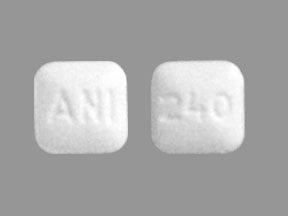
Methazolamide Coupons & Savings Card – Discount Prices from $106.00
Methazolamide is a medication prescribed to reduce high eye pressure caused by conditions such as glaucoma. By lowering this pressure, it helps prevent potential damage to the optic nerve, vision loss, and blindness. This drug is classified as a carbonic anhydrase inhibitor, which functions by reducing the production of fluid within the eye. Typically taken orally as a tablet, the recommended dosage is two to three times daily. While effective, Methazolamide may cause side effects like tingling sensations in the limbs, ringing in the ears, and stomach upset. It is important to be aware of possible interactions with medications such as aspirin and steroids. Always consult your healthcare provider for personalized advice before starting any new medication.
Our coupons are free to use. Before paying, show the pharmacist your Methazolamide savings card to get your free discount. Use our filters below to edit the prescription box to match your needs. The Methazolamide prices will update based on your prescription needs. Above our Methazolamide coupons, you can change your location to see pharmacy prices and costs in other areas. We're here to help you buy Methazolamide at the lowest price with our prescription discount card.
My prescription
Edit
25MG, Methazolamide (180 Tablets)
Select pharmacy

CVS
$106.00
COUPON PRICE
Albertsons
$182.58
COUPON PRICE
Walgreens
$196.56
COUPON PRICE
Walmart
$233.91
COUPON PRICEMethazolamide savings card
Show this card to your pharmacist
CVS
$106.00
BIN
ID
PCN
GRP
019876
LH5092BD8B
CHIPPO
LHX
Powered by
Methazolamide is a medication prescribed to reduce high eye pressure caused by conditions such as glaucoma. By lowering this pressure, it helps prevent potential damage to the optic nerve, vision loss, and blindness. This drug is classified as a carbonic anhydrase inhibitor, which functions by reducing the production of fluid within the eye. Typically taken orally as a tablet, the recommended dosage is two to three times daily. While effective, Methazolamide may cause side effects like tingling sensations in the limbs, ringing in the ears, and stomach upset. It is important to be aware of possible interactions with medications such as aspirin and steroids. Always consult your healthcare provider for personalized advice before starting any new medication.
Our coupons are free to use. Before paying, show the pharmacist your Methazolamide savings card to get your free discount. Use our filters below to edit the prescription box to match your needs. The Methazolamide prices will update based on your prescription needs. Above our Methazolamide coupons, you can change your location to see pharmacy prices and costs in other areas. We're here to help you buy Methazolamide at the lowest price with our prescription discount card.
Related carbonic anhydrase inhibitors prescriptions
coupons from$56.42Save 39%
coupons from$18.39Save 62%
coupons from$6.68Save 90%
More prescriptions for glaucoma
coupons from$35.25Save 84%
coupons from$2950.92Save 72%
coupons from$322.72Save 73%
coupons from$56.42Save 84%
coupons from$458.40Save 72%
coupons from$28.72Save 76%
coupons from$7.20Save 84%
coupons from$52.46Save 86%
Related carbonic anhydrase inhibitors prescriptions
Brinzolamide Save 39%coupons from $56.42
Trusopt Save 62%coupons from $18.39
Acetazolamide Save 90%coupons from $6.68
More prescriptions for glaucoma
Timolol Maleate (once-daily) Save 84%coupons from $35.25
Phospholine Iodide Save 72%coupons from $2950.92
Rhopressa Save 73%coupons from $322.72
Brinzolamide Save 84%coupons from $56.42
Mitomycin Save 72%coupons from $458.40
Travoprost (bak Free) Save 76%coupons from $28.72
Latanoprost Save 84%coupons from $7.20
Apraclonidine Save 86%coupons from $52.46
Methazolamide dosage forms
Use our Methazolamide 25MG coupon with prices from $106.00 for 180 Tablets. You can also use our Methazolamide 25MG coupon with prices from $70.58 for 100 Tablets. We have a Methazolamide 50MG coupon with prices from $42.64 for 30 Tablets. You can use our Methazolamide 50MG coupon with prices from $66.97 for 60 Tablets.
Dosage Quantity Price from Per unit 25MG 180 Tablets $106.00 $0.59 25MG 100 Tablets $70.58 $0.71 50MG 30 Tablets $42.64 $1.42 50MG 60 Tablets $66.97 $1.12 50MG 100 Tablets $107.42 $1.07
| Dosage | Quantity | Price from | Per unit |
|---|---|---|---|
| 25MG | 180 Tablets | $106.00 | $0.59 |
| 25MG | 100 Tablets | $70.58 | $0.71 |
| 50MG | 30 Tablets | $42.64 | $1.42 |
| 50MG | 60 Tablets | $66.97 | $1.12 |
| 50MG | 100 Tablets | $107.42 | $1.07 |
